Download 2024 Aisre Summer School Call
5th AISRe Summer School
POLICY EVALUATION IN REGIONAL SCIENCE
Department of Political Sciences, Roma Tre University
27-31 May 2024
Call for Applications
AISRe, in collaboration with Europe Direct Roma Tre, Inapp and Svimez is proud to announce its fifth summer school on policy evaluation in regional science organized by the Department of Political Sciences at Roma Tre University.
Since the early 2000s, the European Commission has increasingly emphasised the relevance of policy evaluation results for decision-making and policy debate. In order to obtain scientifically and statistically grounded estimates of the European policy effects, several methodological innovations have been introduced in recent years.
The Summer School will introduce PhD students and early career researchers to this rich and expanding debate by merging theoretical and empirical perspectives.
Together with an overview of the most advanced evaluation theories, measures and applications across a wide range of public policy types, the Summer School will also offer a set of tools useful for implementing evaluation exercises with a focus on advanced methods such as counterfactual evaluation and machine learning. Specific lectures will be dedicated to nonexperimental methods and the identification and estimation of spatial spillover effects.
The Summer School is open to doctoral students and early career researchers’ areas active in the field of policy evaluation and will be taught in English.
Organisation of the school
The school is articulated into 5 days from 27 May to 31 May 2024.
Each day will include lecture sessions by expert scholars in the field and paper development sessions in the afternoon.
Each topic will be developed via lectures and data analysis laboratory. Participants are invited to bring their own laptops with Stata and Rstudio installed.
Keynote speakers:
Aline Pennisi (Ministry of Economic and Financial Affairs, Unit NG-EU)
Carmelo Petraglia (University of Basilicata, SVIMEZ)
Guido Pellegrini (Sapienza University)
Lecturers:
Roberto Basile (University of l’Aquila)
Francesca Centofanti (Tor Vergata University)
Giovanni Cerulli (CNR-IRCrES)
Marusca De Castris (Roma Tre University)
Daniele Di Gennaro (Ministry of Economic and Financial Affairs)
Roberta Di Stefano (Sapienza University)
Giovanni Mellace (University of Southern Denmark)
Paolo Naticchioni (Roma Tre University)
Marianna Nitti (Sapienza University)
Giuliano Resce (University of Molise)
Marco Ventura (Sapienza University)
Claudia Vittori (Roma Tre University)
Local scientific and organizing committee
Marusca De Castris (Coordinator), Roma Tre University, Keti Lelo, Roma Tre University; Paolo Naticchioni, Roma Tre University; Claudia Vittori, Roma Tre University.
How to apply
The call is open to PhD students and early career researchers interested in regional science. Applications must be submitted by the 25th of March, 2024 filling out the application form at the link: https://forms.gle/XdCKTyGYUnH79f43A
Candidates must send:
- An updated Curriculum Vitae specifying the candidate’s research experience (Europass format, maximum 5 page);
- an extended abstract of their research project, thesis proposal or working paper, clearly specifying: a) state of the art of the literature on the topic; b) research questions and expected contribution of the work; c) methods and data used or foreseen; d) expected or preliminary results (maximum 2,000 words);
- a motivation letter detailing the reason for application and the candidate’s expectations regarding the school.
- ID card and copy of your AISRe membership or RSAI membership or ERSA membership.
All files (pdf format) can be upload in the application form.
The selection committee will evaluate the applications based on the documentation submitted.
For further information, please write to This email address is being protected from spambots. You need JavaScript enabled to view it. or contact Prof.ssa Marusca De Castris (This email address is being protected from spambots. You need JavaScript enabled to view it.).
A maximum of 30 candidates will be selected for participation, and they will receive an email notification by 10 April 2024.
Registration
The participation fee will be 135 euros, reduced to 110 euros for young researchers (aged under 35 years, doctoral students and post-doc researchers). Coffee breaks and lunches are included in the participation fee.
Participants are required to be individual members of AISRe. Individual membership has a cost of 130 Euros, reduced to 65 Euros for young researchers (younger than 35, doctoral students and post-doc researchers). For school registration, you must register on the AISRe website (www.aisre.it) by creating your own user profile. You will find find instructions for payment in your personal area. For further information, you may contact AISRe secretariat Diana Sarmiento at This email address is being protected from spambots. You need JavaScript enabled to view it..
Venue
The 5th AISRe Summer School will take place at Department of Political Sciences of Roma Tre University, via Gabriello Chiabrera, 199, Roma.

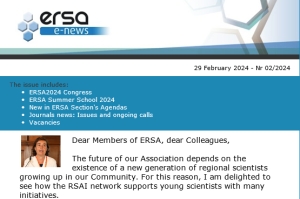

 Dear Members of ERSA, dear Colleagues,
Dear Members of ERSA, dear Colleagues,













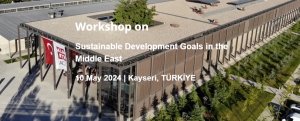
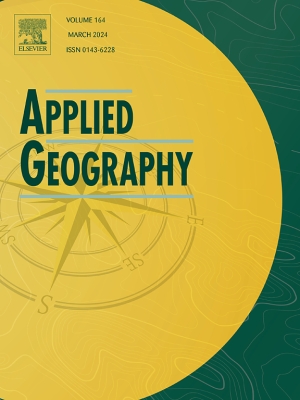
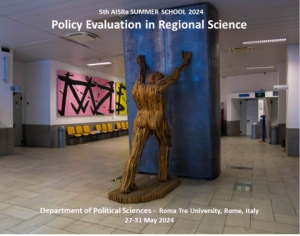


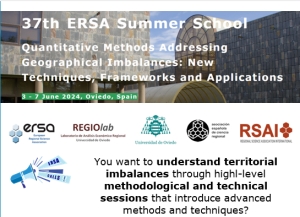



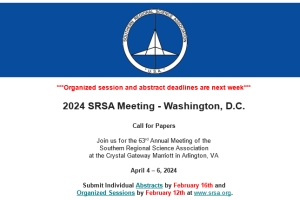

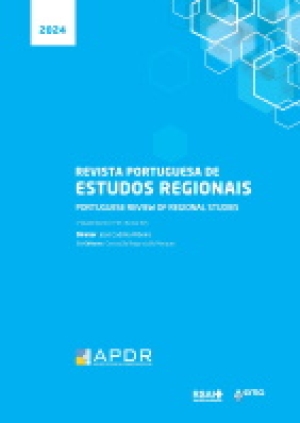


 BE PART OF IT !
BE PART OF IT !
